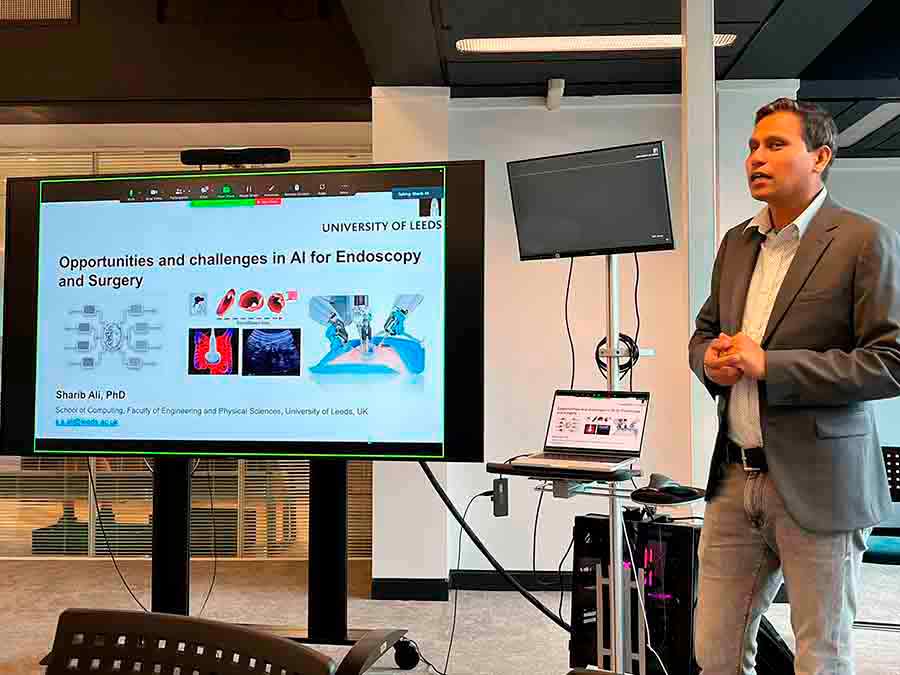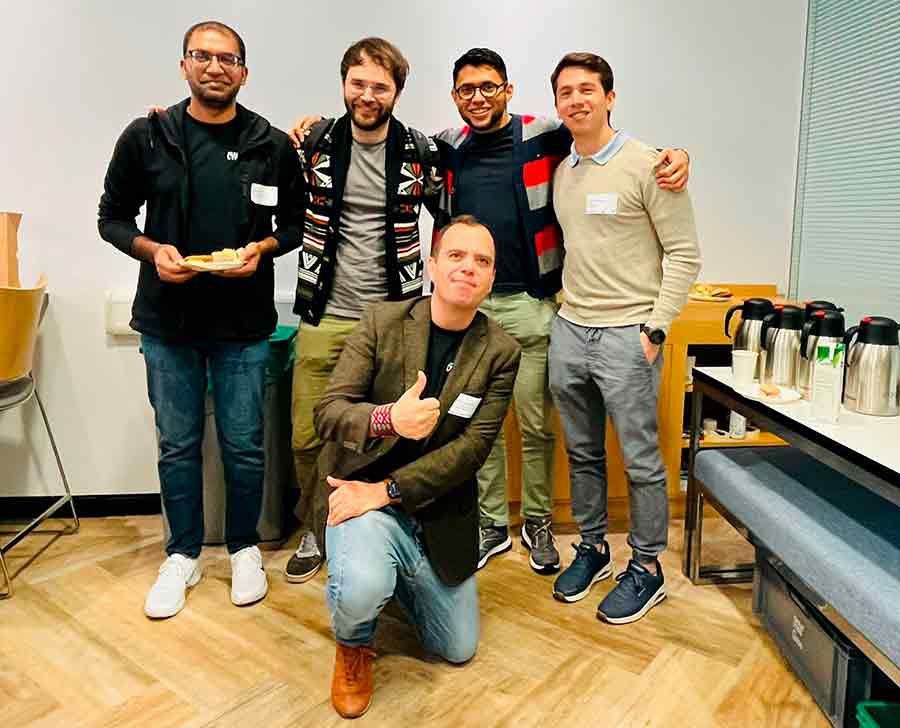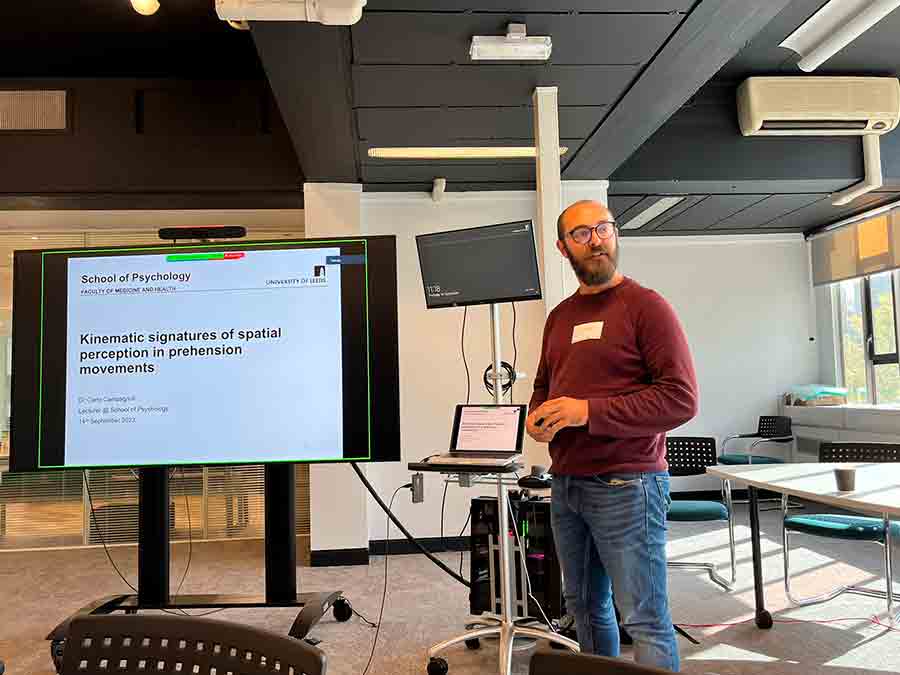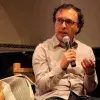Gilberto Ochoa Ruiz, a professor at Tec Guadalajara, and his PhD student, Mansoor Ali Teevno, visited the University of Leeds in the United Kingdom in partnership with the Worldwide Universities Network (WUN) to collaborate, conduct a workshop, and exchange best practices on Artificial Intelligence (AI).
Tec representatives explored the development of AI solutions in healthcare. They conducted the workshop “Opportunities and challenges in emerging technologies in healthcare,” in addition to exchanging best practices and exploring options for research collaboration.
During their stay, they focused on minimally invasive surgery (MIS) research and Ochoa contributed to the research proposal: “Optimise: Novel Robust computer Vision Methods for Minimally Invasive Surgery,” which will continue in 2024.
The visit also promoted international cooperation by exploring new opportunities for joint financing to promote projects with greater impact.
Ochoa is part of the Tec’s advanced artificial intelligence group, made up of researchers from different campuses who also collaborate with the Tec’s AI Hub.

AI to transform healthcare
Gilberto Ochoa, who is the leader of the CV-inside (Computer Vision for Image Analysis & Biomedical Engineering) lab at Tec Guadalajara, said that such international cooperation would help in the creation of AI tools and public datasets that drive new technology for MIS.
He explained that “AI has the potential to transform the way different endoscopic examinations and operative procedures such as laparoscopy are performed.”
Ochoa described computer vision-guided MIS in particular as a viable alternative to open surgery, as it is less painful and leads to shorter recovery times.
However, he pointed out that with current MIS technology, such progress comes at the cost of increased complexity, which places a burden on physicians, resulting in error-prone procedures.
He said this means there is a need for new surgical navigation assistance (SNA) systems, which provide the physician with contextual information about surgical instruments and the area of interest in real time.

Computer vision
Ochoa added that “although accurate tracking of surgical instruments in endoscopy could play a crucial role in MIS,” it remains a challenging task when using current AI models.
“There is a need to develop new computer vision methods for SNA that lead to safer healthcare procedures,” he said.
He added that to achieve this, “new strategies for training computational vision models in MIS must be proposed.”
A team composed of academics from different institutions worked on the research proposal: “Optimise: Novel Robust computer Vision Methods for Minimally Invasive Surgery.”
The initiative was funded by the WUN consortium, of which the Tec is a member, and will continue throughout 2024. Participating were Gilberto Ochoa (Tec de Monterrey), Sharib Ali (University of Leeds), and Kate Farrahi (University of Southampton).
“New computer vision methods need to be developed.”
AI for surgical navigation
The goal of the proposal is to develop robust and generalizable computer vision methods to provide real-time assistance systems that provide the surgeon with contextual information for intraoperative guidance during MIS.
A key part of the project involves the creation of new datasets, as well as the definition of metrics and evaluation methodologies to implement computer vision methods for surgical navigation assistance.
In the long term, they aim to design, test, and validate novel real-time deep learning methods that are robust enough for stringent MIS operating conditions and capable of operating in multiple types of procedures.
One of the main goals of the project is to create a new public dataset to train new computer vision models for MIS, so student Mansoor Ali Teevno is continuing his stay in Leeds to work with researchers and clinicians.
Once this dataset is finalized, it will be made public to the scientific community and other researchers will be able to develop models capable of performing well regardless of which equipment is used for image acquisition in the operation or in which hospital center.

Healthcare opportunities workshop
The workshop “Opportunities and challenges in emerging technologies in healthcare” included a number of talks and a roundtable, with 20 in-person attendees and 30 online.
The first talk was by Kate Farrahi, from the University of Southampton, who presented “Deep Cascade Learning,” for federated learning applications in the context of hospital databases.
Gilberto Ochoa spoke about his project “Endoscopic recognition of kidney stones by computer vision,” funded by ECOS Nord and CONACHTY with colleagues from the Centre de Recherche en Automatique in France.
“AI has the potential to transform.”
Another presentation was entitled “Kinematic signatures of spatial perception in prehension movements,” delivered by Carlo Campagnoli, from the School of Medicine and Health, University of Leeds.
Lastly, Sharib Ali, from the University of Leeds, talked about “Opportunities and Challenges in AI for Endoscopy and Surgery.”
Among those attending the workshop were several members of the LatinX in AI community, of which Gilberto Ochoa Ruiz is a member, as well as several Tec graduates.
READ ALSO:





